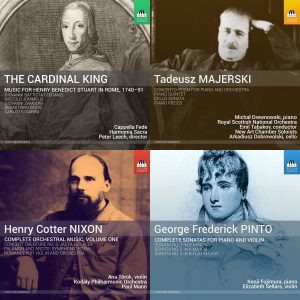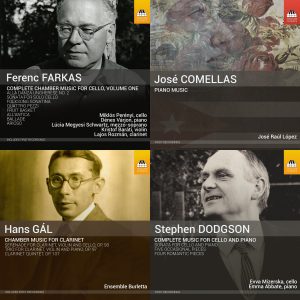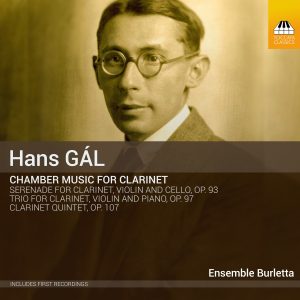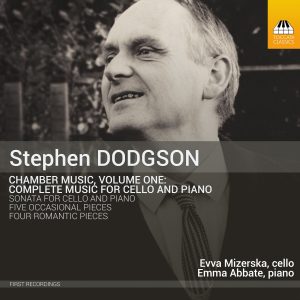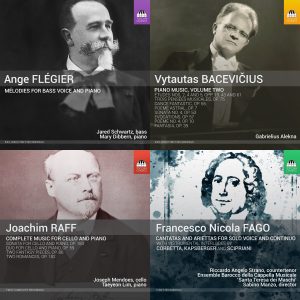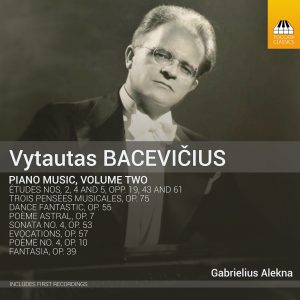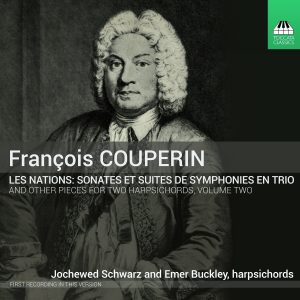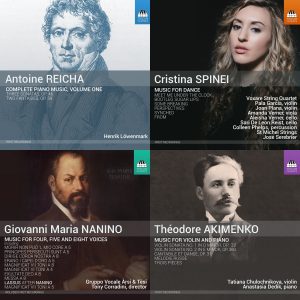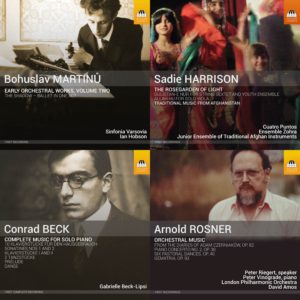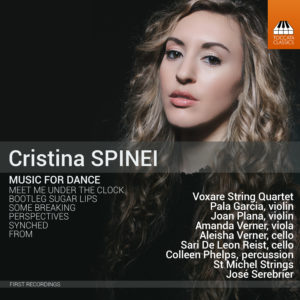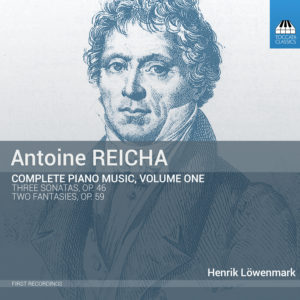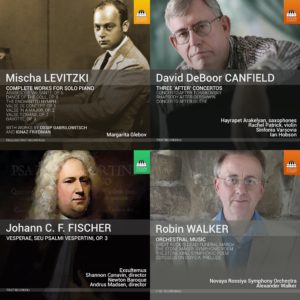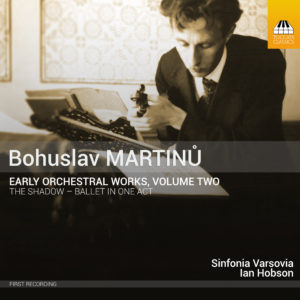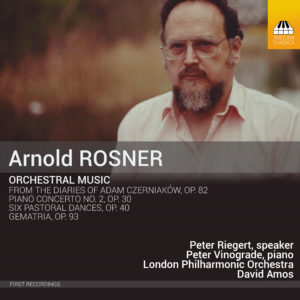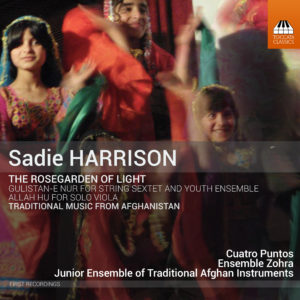Search Results for "Space Wolf: The First Omnibus mp3 torrent" – Page 39
December 2016 Bundle
Included in this bundle:
October 2016 Bundle
Included in this bundle:
- José Comellas: Piano Music
- Hans Gál: Chamber Music for Clarinet
- Ferenc Farkas: Complete Chamber Music for Cello, Volume One
- Stephen Dodgson: Chamber Music, Volume One: Complete Music for Cello and Piano
*TOCC0345 Not Included in the HDWAV Bundle
Hans Gál: Chamber Music for Clarinet
Like Brahms and Reger, Hans Gál (1890–1987) expressed some of his last musical thoughts in the form of a Clarinet Quintet, this one written when its composer was 87 years old. But the earlier works here – the Serenade written in Vienna between Gál’s expulsion from Nazi Germany and his flight after the Anschluss, and the Trio, composed in his new home of Edinburgh – reveal that its elegiac, autumnal lyricism was his natural mode of expression. In these three scores, indeed, he produced some of the loveliest music in the clarinet repertoire.
Ensemble Burletta
Shelley Levy, clarinet
Katalin Kertész, violin
Joanne Green, violin (Tracks 1 – 3)
Nichola Blakey, viola (Tracks 1 – 3)
Cressida Nash, cello (Tracks 1 – 3)
Pavel Timofeyevsky, piano (Tracks 4 – 6)
Stephen Dodgson: Chamber Music, Volume One: Complete Music for Cello and Piano
The cello works of the London-born Stephen Dodgson (1924–2013) present his musical personality in a nutshell. The style is direct but rich in allusion, from Purcell to Janáček, with a lively, sometimes brittle, sense of humour adding a Shostakovichian irony, all fused together in an elegant, individual voice. And the remarkable clarity of the instrumental textures underlines a strong sense of narrative, with the cello almost as a human voice, unfolding its story with understated passion.
Evva Mizerska, cello
Emma Abbate, piano
September 2016 Bundle
Included in this bundle:
Vytautas Bacevičius: Piano Music, Volume Two
The Lithuanian pianist and composer Vytautas Bacevičius (1905–70) is one of the undiscovered pioneers of the twentieth century. This second volume of his piano music presents works written between 1927 and 1966 and shows the evolution of his musical language from the post-Skryabin style of the early works, via the influence of Debussy, Prokofiev and Stravinsky, to a highly individual modernism, akin to that of his fellow radicals Edgard Varèse and Stefan Wolpe – all three of them Europeans in exile in New York.
Gabrielius Alekna, piano
August 2016 Bundle
Included in this bundle:
- Emil Tabakov: Complete Symphonies, Volume One
- Beat Furrer: Works for Choir and Ensemble
- Bernard Rose: Music for Choir and Organ
- François Couperin: Music for Two Harpsichords, Volume Two
*TOCC0258 Not Available in HDWAV format and not included in that bundle
François Couperin: Music For Two Harpsichords, Volume Two
François Couperin published two collections of chamber music – the Concerts Royaux in 1722 and Les Nations in 1726 – in what today would be called open scoring, so that they could be performed by whatever instruments were to hand. But he confessed in the preface to a later publication that he himself preferred to perform them on two harpsichords, although that suggestion had to wait for this series of two albums to be taken up in recordings. Here Les Nations and movements from the Concerts Royaux are presented with a number of his Pièces de clavecin, also in rarely heard realisations for two harpsichords.
Emer Buckley and Jochewed Schwarz, harsichords
July 2016 Bundle
Included in this bundle:
June 2016 Bundle
Included in this bundle:
Cristina Spinei: Music for Dance
The Nashville-based Cristina Spinei (born in Connecticut in 1984) writes music which pulses with the rhythmic energy of the American minimalist tradition – ‘pulling a lot out of only a little material’, as one reviewer put it. Small wonder, then, that she is much in demand with choreographers, and this album presents music written for dance: four string quartets, a duo for cello and percussion and a work for string orchestra – all of them gently mesmeric, like some kind of unhurried ritual.
Voxare String Quartet
Pala Garcia and Joan Plana, violins
Amanda Verner, viola
Aleisha Verner, cello
Sari De Leon Reist, cello
Colleen Phelps, percussion
Antoine Reicha: Complete Piano Music, Volume One
For two hundred years the piano music of the Czech-born composer Antoine Reicha (1770–1836) – friend of Haydn and Beethoven, teacher of Berlioz, Liszt and Franck – has been buried treasure. Reicha was an important influence on composers of the next generation (indeed, Berlioz was happy to lift a few ideas from him) but apart from an innovative set of fugues his piano works have remained unknown since his own day. Both encompassing Baroque practices and looking forward to the twentieth century, they are full of harmonic and other surprises that show this liveliest of musical minds at work.
Henrik Löwenmark, piano
May 2016 Bundle
Included in this bundle:
Martinů: Early Orchestral Works, Volume Two
Martinů’s mature orchestral works are now a mainstay of the repertoire. But the generous quantity of orchestral music he wrote between his late teens and early thirties is as good as unknown; some of it, indeed, has never even been performed. That’s the case with the ballet Stín (‘The Shadow’) from 1916, which has its world premiere in this recording – astonishingly, in view of the quality of the music it contains. Although the action of the ballet is dark – a girl dances with her shadow in the presence of Death – Martinů’s score presents a series of remarkably buoyant and cheery dances.
Dorota Szczepańska, offstage soprano
Anna Maria Staśkiewicz, violin
Agnieszka Kopacka, piano
Sinfonia Varsovia
Ian Hobson, conductor
Arnold Rosner: Orchestral Music
The musical language of the New York-based Arnold Rosner (1945–2013) clothes the modal harmony and rhythm of pre-Baroque polyphony in rich Romantic colours, producing a style that is instantly recognisable and immediately appealing. The piano concerto which opens this album reveals that his personality was present from the start: although it was written before he had any formal training in composition, its confidence and individuality are striking. The other works here show the range of Rosner’s music, from his fondness for Elizabethan dance and his exploration of symphonic minimalism to an identification with his Jewish roots, in a harrowing setting for speaker and orchestra of extracts from the diary of the leader of the Warsaw Ghetto.
Peter Vinograde, piano
Peter Riegert, speaker
London Philharmonic Orchestra
David Amos, conductor
Sadie Harrison: The Rosegarden of Light
Since its foundation in 2010, the Afghanistan National Institute of Music in Kabul has been working small miracles. Its students – among them orphans, street vendors and other disadvantaged children – play both western and traditional Afghan instruments in groups which include a ground-breaking girls’ ensemble. On this album, the fruit of a remarkable collaborative project, they meet the US string sextet Cuatro Puntos. In Sadie Harrison’s Gulistan-e Nur: The Rosegarden of Light, they perform Afghan songs and dances which Harrison’s music then explores and develops. Kevin Bishop’s arrangements of Afghan tunes likewise link east and west in a visionary venture celebrating the power of music to transform lives as it also revives and rebuilds Afghan musical traditions.
ANIM Junior Ensemble of Traditional Instruments
Kevin Bishop, viola
Ensemble Zohra
Cuatro Puntos
Stay In the Know
JOIN THE TOCCATA NEWSLETTER
"*" indicates required fields
By visiting our site, you agree to our privacy policy regarding cookies, tracking statistics, etc.
